A city for just the elites? Why some locals are feeling left out of Indonesia's new capital Nusantara
Some residents are earning more from the influx of workers, but say they’re falling sick from the construction dust. Others face eviction and are seeing cracks in their homes.
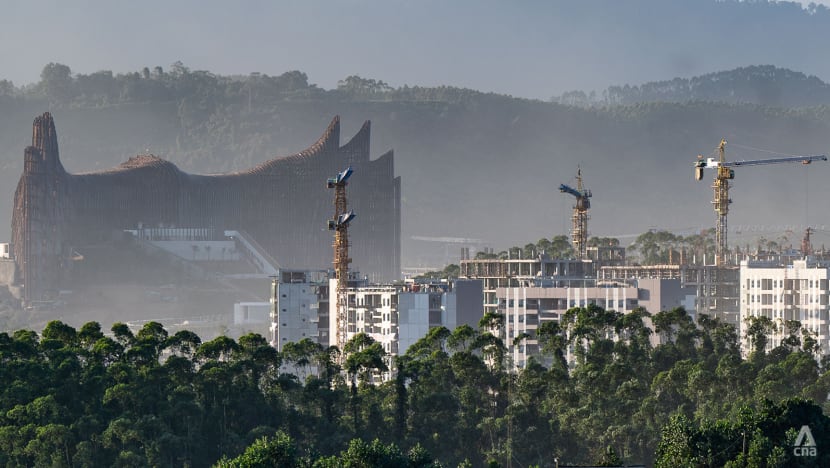
The presidential palace (left) in Nusantara on Jul 29, 2024. (Photo: CNA/Danang Wisanggeni)

This audio is generated by an AI tool.
BALIKPAPAN: Shortly after Mdm Ruth Anita Koraag and Mr Setiyo Indro Purnomo got married 16 years ago, he built their home in Balikpapan, a seaport city in East Kalimantan known for its oil industry.
As Mr Setiyo is a pastor, the house also serves as a church where congregants gather every Sunday.
Two years ago, their lives were turned upside down when the authorities informed them that they had to move because of a highway to be built nearby. The road was to connect Balikpapan with Indonesia’s new planned capital, Nusantara.
The government offered IDR1.3 billion (US$81,645) in compensation, but the couple – who have three children – have yet to accept it as they believe the sum is too small and would be insufficient to buy a new house.
“My concern is when we get compensated and we have to be evicted, where will we live?” said Mdm Ruth, 41, as tears rolled down her cheeks.
“Where can we worship? Do we have to build everything from scratch again? I feel sorry for my husband if he has to build everything again.”
These days, the noise of excavators building the highway fills their home, which is about 50 metres away, and often frightens their youngest child, who is two-and-a-half years old. The family also lives in fear of being forced to move suddenly.
Should they relocate, Mr Setiyo may not be able to build a new church easily because of certain requirements for building a place of worship in Muslim-majority Indonesia.
At least 60 local residents must approve it, and the place of worship must have at least 90 worshippers, among other requirements.
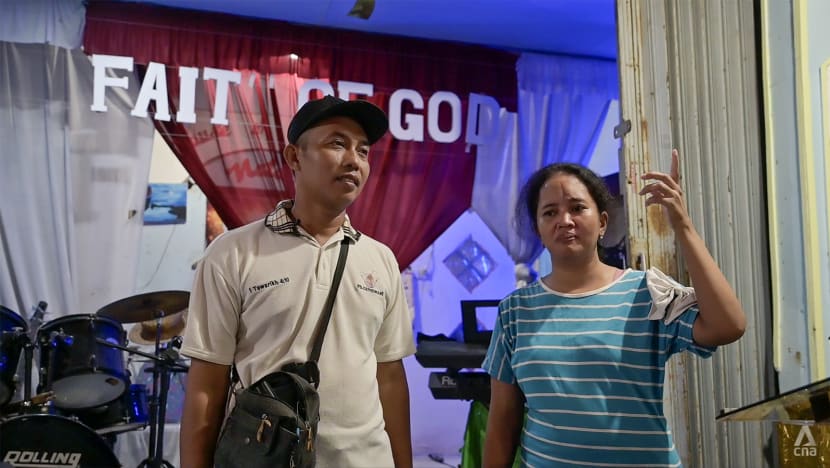
In 2019, President Joko Widodo decided that Indonesia’s capital would move from Jakarta – a bustling but sinking, congested and over-populated metropolis – to eastern Kalimantan.
The government picked a site in the middle of East Kalimantan’s forest to be the country’s new capital Nusantara, also known as Ibu Kota Nusantara or IKN.
It claimed that because IKN is the geographic centre of the sprawling archipelago, it would be a capital for everyone and economic development would no longer be Java-centred.
The initial plan was for Indonesia’s capital to move from Jakarta to Nusantara this year and for the country’s Independence Day on Saturday (Aug 17) to be celebrated there.
With preparations for both milestones well underway, concerns have emerged on how inclusive and beneficial Nusantara will be, and whether it will merely be a mega project of the elites.
Nusantara is widely seen as Mr Widodo’s legacy, but president-elect Prabowo Subianto has pledged to continue building it after taking office on Oct 20 to ensure more equitable development in the country.
During the first Cabinet meeting held in Nusantara on Monday (Aug 12), Mr Prabowo said: “I have emphasised several times that we will complete this IKN, we will complete it well because it is really needed.”
Reiterating the desire to “ease the burden” on Java, he added: "I am determined to continue it. If possible, we will speed it up."
NOISE, DUST, CRACKS
In Balikpapan, the nearest city to Nusantara, some locals feel they do not stand to benefit from the project.
The construction of Nusantara, estimated to cost about US$30 billion, is expected to be completed in five stages.
The first phase, comprising the construction of the presidential palace, a few ministries, and basic infrastructure such as roads and housing, is slated to be finished by this year.
The final phase is expected to be completed by Indonesia’s centennial in 2045, with the new capital connected to surrounding cities such as Balikpapan and Samarinda.
Currently, Nusantara is about a two-hour drive from Balikpapan, but the government wants to cut it by half with a new highway.
Hundreds of people including Mdm Ruth’s family are expected to make way for the new infrastructure, according to their local community leader Mr Subroto.
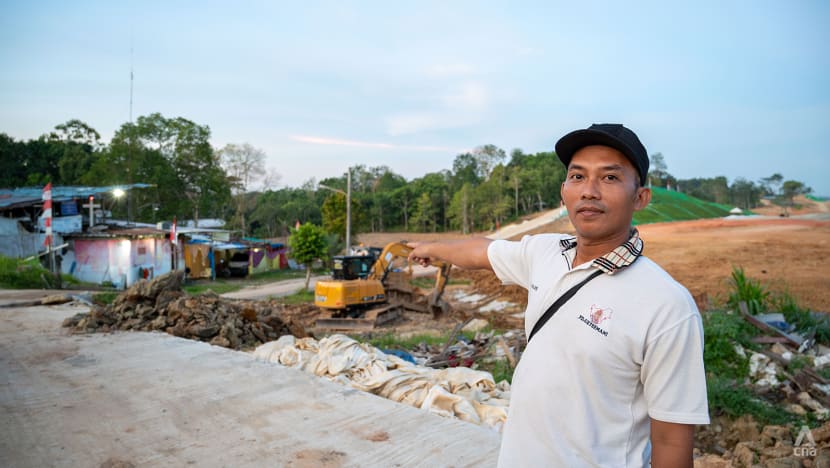
Mdm Ruth's husband, Mr Setiyo, said he agrees with moving the capital to Kalimantan as it would make the area more economically vibrant and draw more people. Jakarta’s population is about 10.5 million, while East Kalimantan province has about 3.7 million inhabitants.
However, he said the move should not harm the environment or locals who already live there.
“We are already feeling the impact of it (the new capital),” he said.
“My children are psychologically agitated by the noise (of the highway construction).”
Not everyone in Mr Setiyo’s urban village of Karang Joang needs to move due to the highway but they are impacted in other ways, said Mr Subroto.
“There are many cracks in my house due to the construction,” said Mr Subroto, who goes by one name.
“It is also very noisy and dusty. Many villagers, including me, are sick – we cough and feel itchy,” said the 65-year-old.
When CNA visited him on Jul 30, Mr Subroto pointed to the cracks in his living room and bathroom.
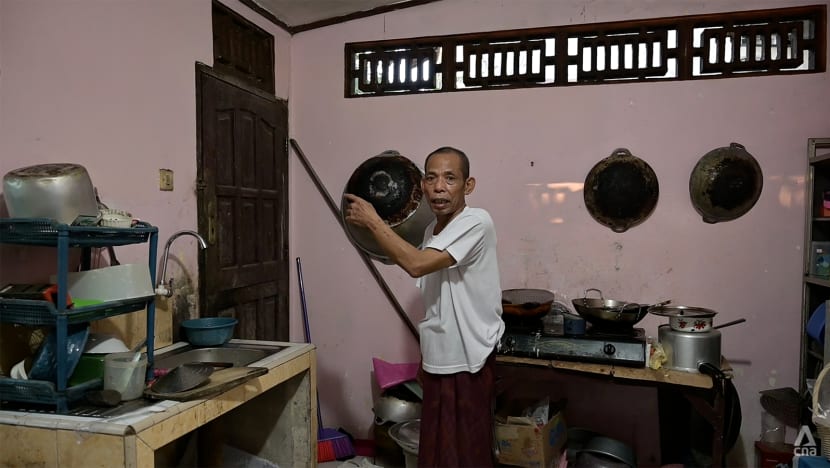
CNA was unable to verify how the cracks occurred, but Mr Subroto claimed that the construction nearby has affected his home.
According to him, other villagers have had the same experience. Mr Subroto said he has sought compensation from the highway project’s management, but has not received any.
Apart from villagers, some local journalists in East Kalimantan say they have been kept out of the loop on Nusantara-related news.
When Nusantara was first announced, a veteran journalist from Balikpapan said he was enthusiastic about reporting on the project.
He also welcomed the prospect of better hospitals and schools, which would benefit residents.
But the excitement has slowly faded. The journalist, who asked to be unnamed, said he has faced problems reporting on Nusantara.
His queries to the IKN authorities are often unanswered, and local journalists are often not told about events related to Nusantara, he said.
For example, his questions on how local journalists could cover the Aug 17 Independence Day celebration have not been answered as of Aug 7, 10 days before the event.
“The first Independence Day celebration at IKN is historic. And I am certain every journalist wants to cover it,” he told CNA.
“So I asked IKN's authority how to cover it, but they said it was not their responsibility. Where should we local journalists seek information on how to cover an event about to happen in our region?”
In his opinion, the authorities prefer giving information to Jakarta-based journalists. This, he said, feeds the perception that Nusantara is for the elites.
When contacted, the head of the presidential secretariat Heru Budi Hartono said his secretariat is coordinating the Independence Day celebration, and is still discussing the matter with the governor of East Kalimantan as well as the acting head of the Nusantara Capital Authority, Minister for Public Works Basuki Hadimuljono.
“We are also still compiling data about the vehicles which can enter IKN on Independence Day,” he told CNA on Aug 8.
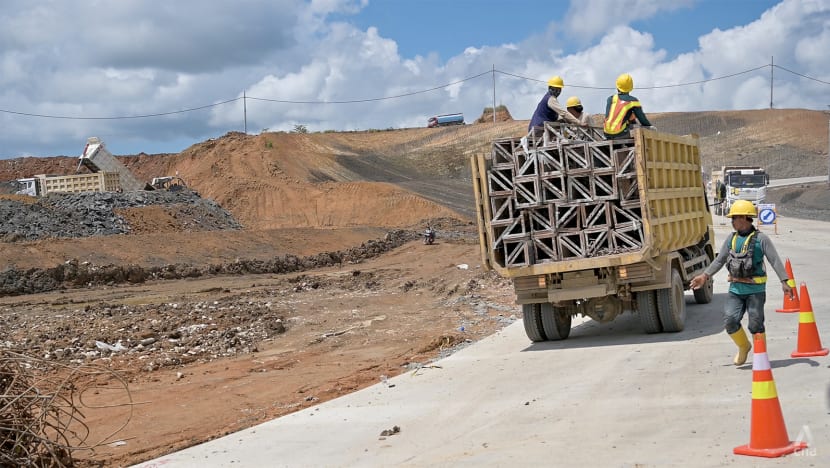
MORE MONEY, BUT AT A PRICE
Over in Nusantara, the atmosphere is more sanguine, albeit infused with uncertainty.
According to a 2023 revised law, the new capital’s size is about 252,000ha, about four times bigger than Jakarta and three times bigger than Singapore.
Nusantara consists of three main areas: the core area of the central government, the capital city area and the Nusantara development area.
The smallest area is the core area of the central government (KIPP) at about 6,000ha. The capital city area (K-IKN) is the second-biggest at about 56,000ha, while the remainder is the Nusantara development area (KP-IKN).
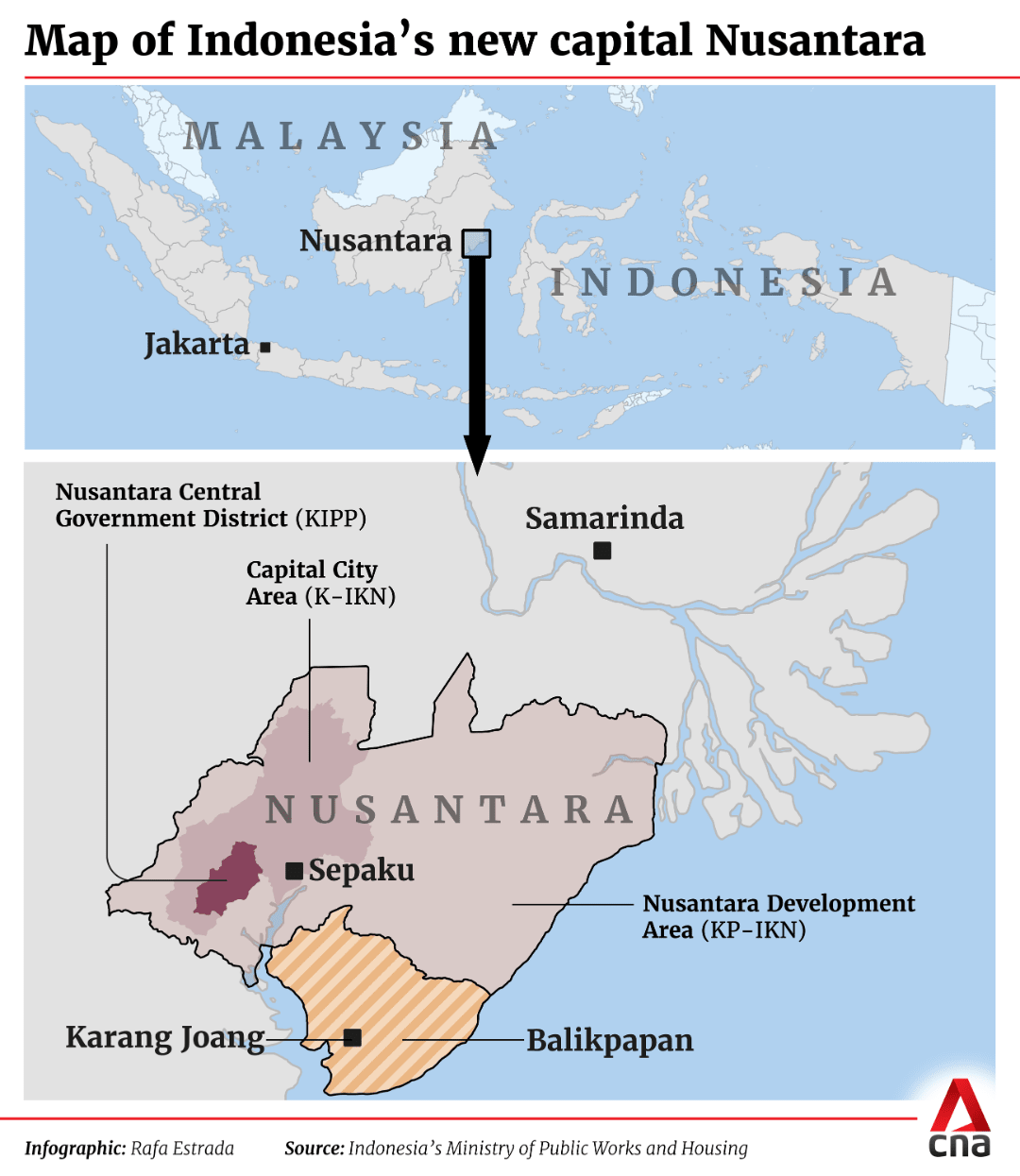
Construction is currently underway in the core area, where ministerial buildings, housing, hospitals, and other facilities are being built.
The building closest to completion is the presidential palace – in which President Joko Widodo slept for the first time on his trip to Nusantara last month – that resembles the mythical bird Garuda. The Independence Day celebration will be held at a field opposite the palace.
The feverish pace of construction means residents of the Bumi Harapan village in Sepaku district, which lies within the capital city area, have had to put up with air and noise pollution, said Mr Ishak, a resident.
A fellow villager, Mdm Julfah, 36, said she has had to take her three-year-old daughter to the doctor every month for respiratory illness due to pollution from construction activities.
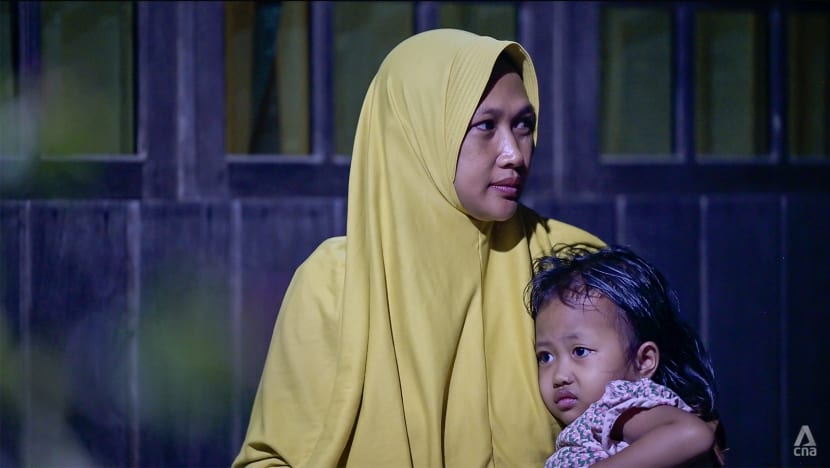
The influx of workers, however, has brought some perks.
Since construction started in 2022, Mdm Julfah has seen an increase in household income. She is able to earn IDR2.5 million (US$156) daily from supplying fried snacks to food establishments, up from about IDR500,000 per day before construction began.
Some villagers have also opened businesses like small lodges or restaurants to cater to demand, said Mr Ishak, who goes by one name.
NO MORE POTHOLES
The face of Sepaku has also changed. It was a sleepy district when CNA first visited in 2019, shortly after Mr Widodo announced that the capital would move.
Home to about 38,000 people, it was dotted with paddy fields and trees, with a potholed road that extended to Balikpapan.
A small traditional market called Rebo, along Sepaku’s main road, barely showed signs of trade.
When the COVID-19 pandemic eased in 2022, and construction of Nusantara started in July of that year, Sepaku began industrialising.
Gone are the holes in its main road, which is now choc-a-bloc with big trucks transporting materials to the core area.
Gone are the paddy fields. Instead, the remaining trees have turned brown, covered in thick construction dust.
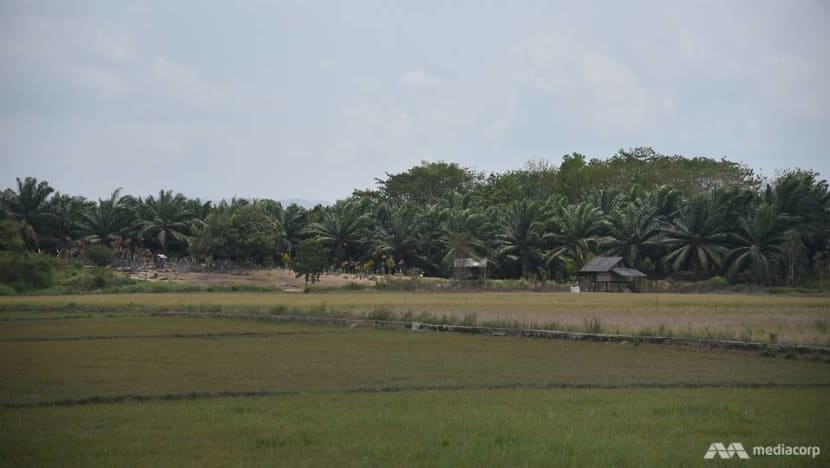
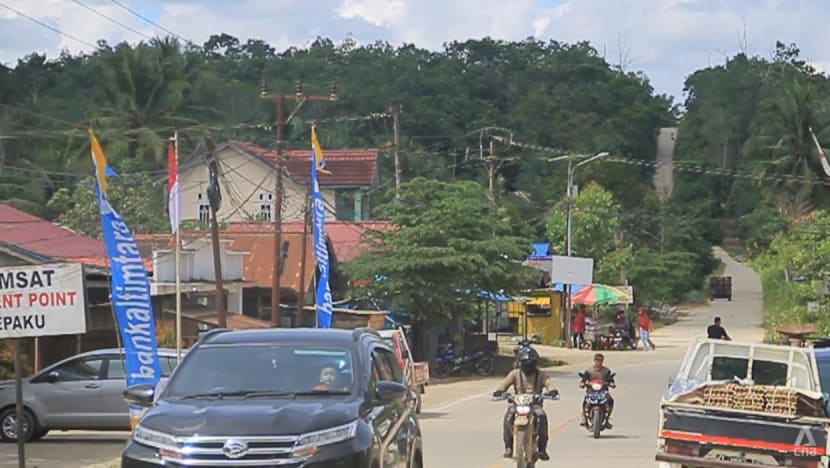
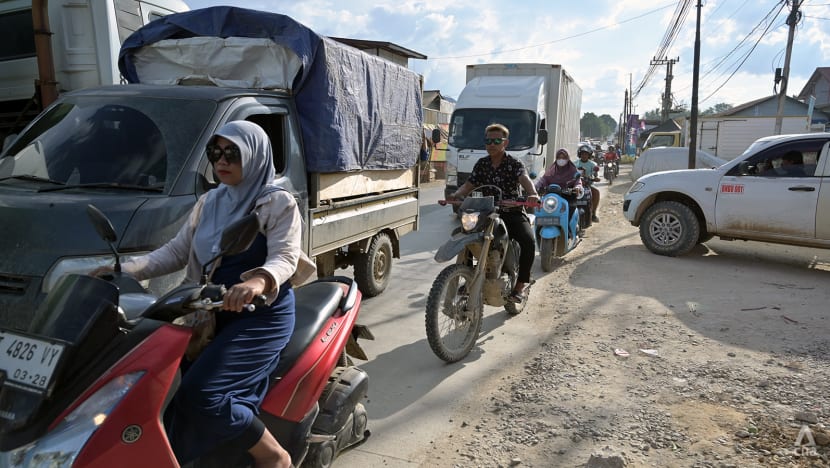
The market, meanwhile, is now a lively commercial space with new shops.
Due to their proximity to IKN, some Sepaku residents have had to give up their land for the project.
Mr Ishak, a landowner, said he has not been fully compensated for the land parcels near the core area he has had to give up.
Of about 7,500 square metres of land he handed over to the government, only about 25 per cent has been paid for so far, he said. CNA has reached out to the IKN authority on Mr Ishak’s case.
Another worry looms. As Bumi Harapan village lies within the capital city area, Mr Ishak worries the community may be asked to move one day.
“We here feel disturbed … Jokowi said in February 2022 to the media that they would not disturb the nearby people (in Nusantara),” said Mr Ishak, 60.
Mr Ishak, who has lived in Sepaku since 1986, said he does not want to become like a group of native people of Jakarta called the Betawi.
“When you now look at Jakarta, are the Betawi people still there? No, they are not. They live on the outskirts,” said Mr Ishak, referring to how the majority of people there today are Javanese, while many of the Betawi live on the city’s outskirts as they have sold their land for Jakarta’s development.
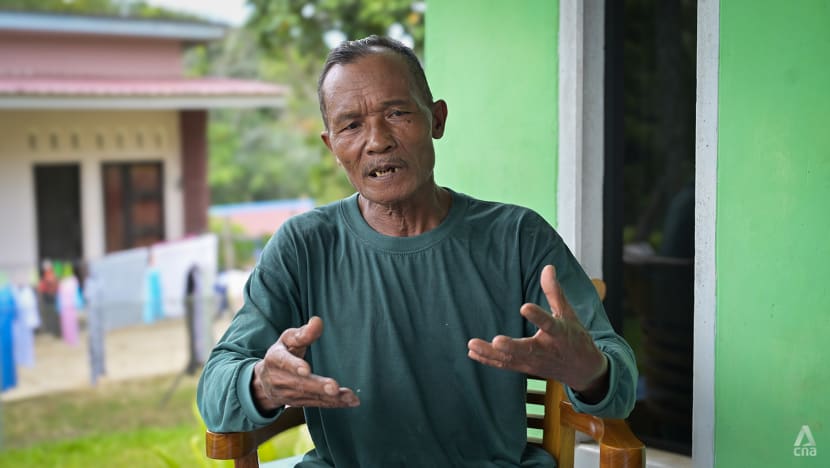
“BIG JOB” SET TO CONTINUE, BUT LOCALS SEEK FAIR DEAL
Many observers believe Mr Widodo is pushing hard for the construction to be completed this year, as well as for the Independence Day celebration – his last as sitting president – to be held at IKN.
While he previously said that he would move to Nusantara in July, Mr Widodo conceded on Jul 29, during a three-night visit to check on its “latest progress”, that building a new capital requires many years.
The lack of water and electricity supply has marked Nusantara’s slow progress. When CNA had lunch at a restaurant in the capital city area that day, the electricity supply was disrupted and the restaurant had no running water.
Another restaurant nearby also experienced a power cut and had to use a generator.
When asked about leakage of drinking water during tests, Mr Widodo replied: “Technical stuff like that happens a lot, not just once, but a lot because this is a big job, involving a time span that can be 10 years, 15 years, 20 years. This is not a job for just a year or two.
“Many think we are rushing things. No, we are not rushing the work; it is according to the existing progress and plans.”
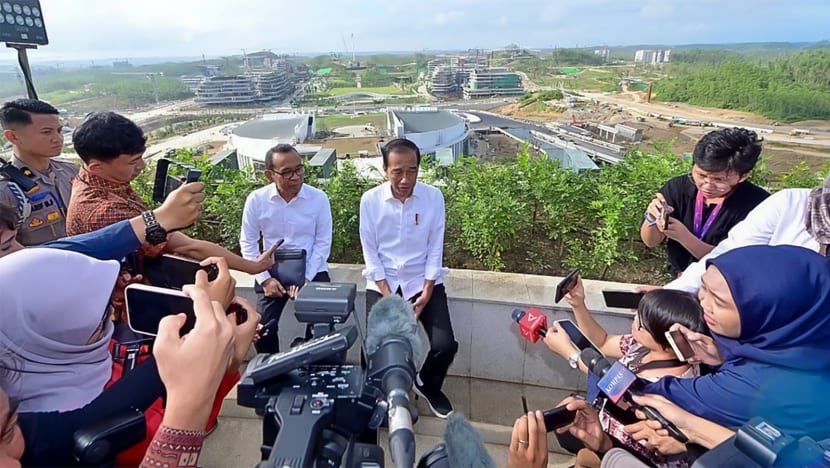
Speaking to reporters in Nusantara on Aug 12, Mr Prabowo – accompanied by Mr Widodo – said the construction of IKN could take dozens of years, but is optimistic it would be functional in about five years.
“I am not an engineer, but I see the potential. I am sure it will be good in five, six years. It will be ready (for use),” Mr Prabowo said.
Nusantara has yet to draw foreign investors and still lacks funding, but analysts agree it is likely to continue.
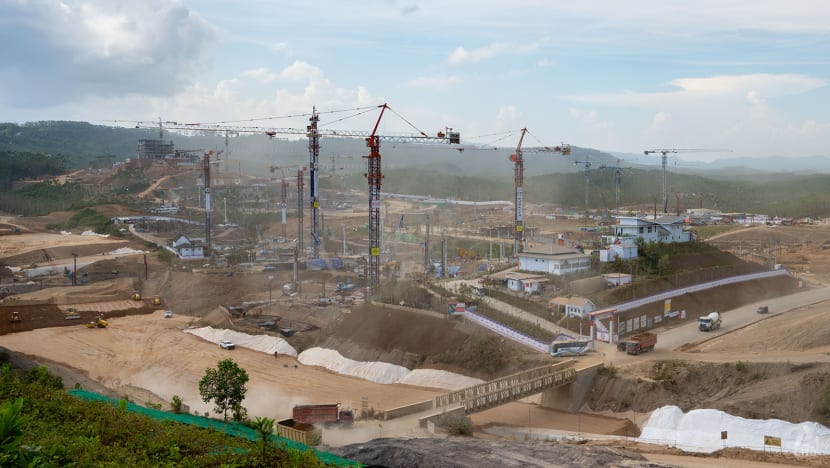
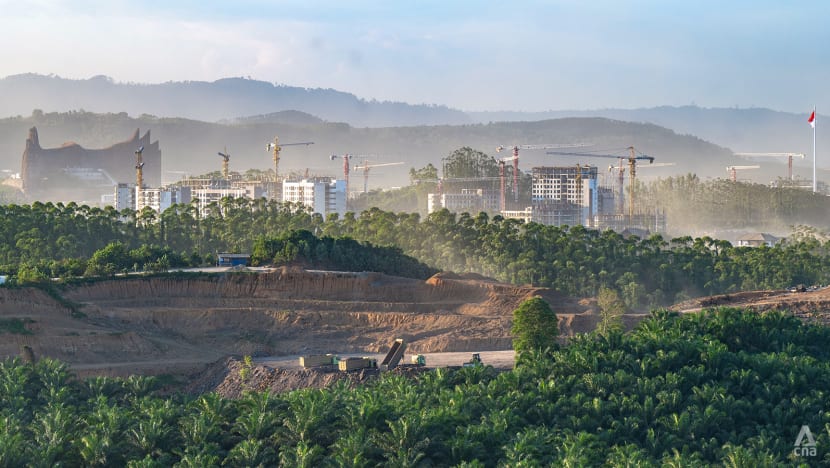
“It is not a matter of whether IKN is important or not, but it is too big to fail,” said Mr Andry Satrio Nugroho, an economist from the Institute for Development of Economics and Finance (INDEF).
In spite of Mr Prabowo’s latest pledge, however, it is possible other priorities could slow down the development of Nusantara and add to its costs, he said.
“We hope that because it has started, it must continue at the same pace,” he said.
Mr Widodo could also take steps to ensure the continued development of Nusantara after he steps down, said political analyst Arya Fernandes from the Centre for Strategic and International Studies (CSIS). “I think he has made a deal with Prabowo to adopt (Nusantara as) a strategic programme within the new government,” said Mr Arya.
As Indonesia’s leaders work to keep Nusantara on track, what matters to East Kalimantan residents like Mdm Ruth is a fair deal for those affected by the project.
“I can only pray (for) a way to get a new (piece of) land and build a new house,” she said.


















